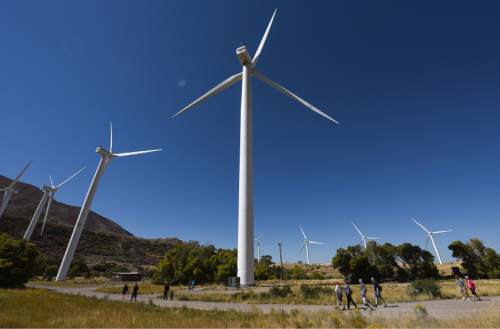This is an archived article that was published on sltrib.com in 2016, and information in the article may be outdated. It is provided only for personal research purposes and may not be reprinted.
Rocky Mountain Power's announcement that the company plans to request a "slight price decrease for Utah customers" doesn't mean the utility is offering to cut customers' electricity rates, according to two advocates for Utah energy consumers.
The utility announced Tuesday morning that it plans to ask the state Public Service Commission — the three-person body that oversees utilities in Utah — to cut this year's power bills by a total of $14.3 million in light of decreased fuel costs and rising renewable-energy-credit revenues, said company spokesman Paul Murphy. The adjustments are expected to reduce the average customer's power costs by $6.48 during the course of a year.
But Kelly Francone, executive director of the Utah Association of Energy Users, said the announcement doesn't actually mean the company has spontaneously opted to cut rates — it is making a required adjustment after a routine review of expenses that were due Tuesday.
Rocky Mountain Power's news release didn't contain any false information, Francone said, but it "might be a little misleading to people trying to figure things out" after a bill passed in the Legislature last week that would allow Rocky Mountain Power to change a cost-sharing mechanism that impacts customers' power bills.
The utility is required to estimate how much it plans to spend on fuel and electricity purchases. At the end of the year, it reports its actual expenses to the Public Service Commission. Currently, if the company's actual expenses exceed its estimate, it's allowed to charge 70 percent of the difference to customers' electricity bills.
In 2015, Rocky Mountain Power's fuel and electricity costs were more than it had planned — but it underestimated costs by a smaller margin than it had the year before, resulting in this apparent decrease in electrical rates, said Michele Beck, director of the Utah Office of Consumer Services.
Beck said she doesn't think Rocky Mountain Power is trying to mislead customers; "they're just presenting this in a positive light."
According to a docket posted online Wednesday morning by the Public Service Commission, Rocky Mountain Power set a base expense rate of $25.31 per megawatt hour. In 2015, the company actually spent $25.99 per megawatt hour, according to the docket.
Murphy said he agreed with Beck on the facts of how Rocky Mountain Power calculated its energy balancing, but had drawn a different conclusion from them.
The matter is complicated, he said, and the bottom line is that customers will still pay less for power this year if the adjustments are approved by the Public Service Commission.
"What we're trying to do is charge our customers what it costs to provide them electricity, no more and no less," he said, "and our goal, truthfully, is to try to keep prices as low as possible."
Rocky Mountain Power also requested to recover expenses associated with the closure of the Deer Creek Mine, resulting in tariff rates that are .7 percent lower than last year's.
Additionally, Rocky Mountain Power credited customers for unexpectedly large revenues from the sale of renewable energy credits — which businesses may purchase to offset the environmental impacts of their own operations — resulting in more savings for customers.
When SB115, which garnered legislative approval at the last minute after initially failing a vote in the House, takes effect, Rocky Mountain Power will be able to charge customers 100 percent of what it spends over initial cost estimates, Beck said.
If SB115 were already in effect, it wouldn't have much impact on the rate announcement, Murphy said; he estimated that the average customer might be saving $5 instead of $6.48.
But Beck said that although she hadn't checked Rocky Mountain Power's math, she estimated SB115 would have resulted in millions of dollars being charged collectively to power customers.
The Office of Consumer Services has hired a consultant to review the filing in detail, she said, and will issue additional comments on the matter later.
Twitter: @EmaPen



